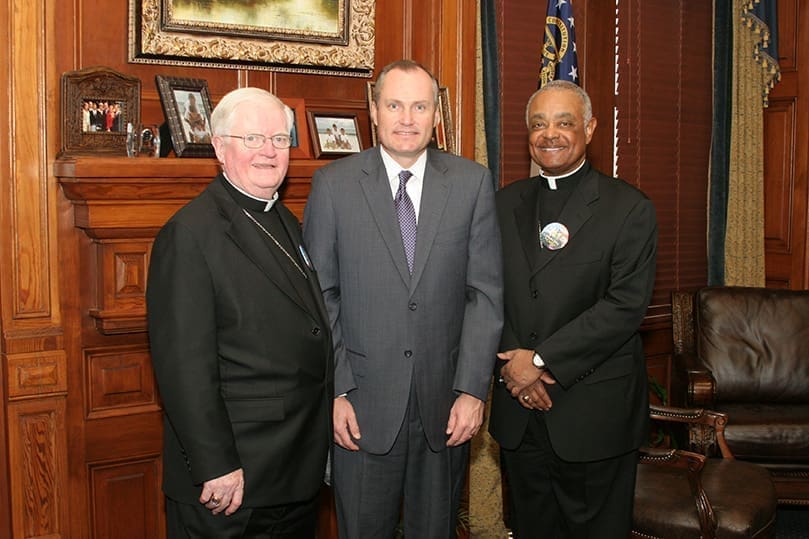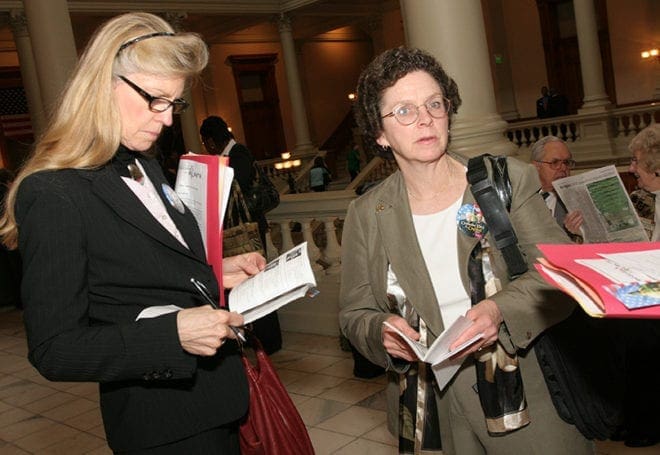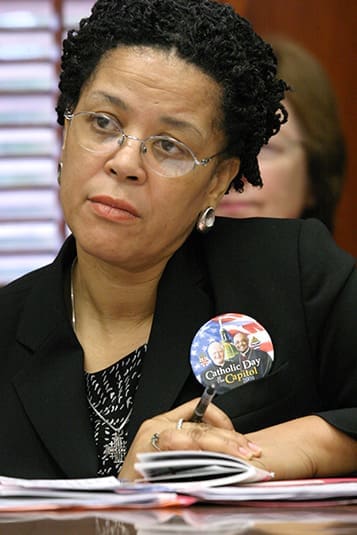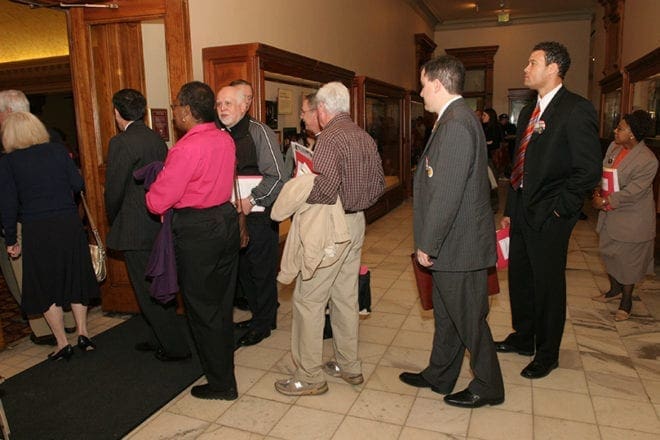 Photo By Michael Alexander
Photo By Michael AlexanderAtlanta
Catholic Georgians Take Politics 101 At Capitol
By ANDREW NELSON, Staff Writer | Published February 14, 2008
Willa McGarity and Margaret Ann Harris were among scores of Catholics who took to the shiny marble halls of the Georgia Statehouse on Tuesday, Feb. 5, to encourage lawmakers to vote against death penalty legislation and an English-only language proposal.
McGarity, a retired nursing instructor, and Harris, who worked in advertising, are friends and novices in the ways of politics. Both wanted to learn about the intersection of making laws and faith.
Harris called the day a “fact-finding mission for my faith.”
“We are just here to voice what is the right thing to do, according to the Bible,” she said.
But she knows the Catholic view isn’t the only view.
“We Catholics are just part of what makes up the community. We don’t run the show,” she said.
As the population boom continues to bring Catholics to Georgia, the Catholic vote will play a larger part in elections. There are some 732,000 Catholics statewide.
The second annual Catholic Day at the Capitol was to let lawmakers know Catholics care about legislation. Even if the nearly 70 people participating in the day did not get to see their representatives, they left bookmarks letting them know constituents watch how they vote. Others promised to write letters to their elected officials.
Lt. Gov. Casey Cagle and others received church leaders as guests.

Margaret Ann Harris of Immaculate Heart of Mary Church, Atlanta, left, stands with archdiocesan pro-life director Mary Boyert as people prepare to go make appointments to see their representatives. Photo By Michael Alexander
Savannah Bishop J. Kevin Boland served as the chaplain for the day for the Georgia Senate. And in his prayer in that chamber, Bishop Boland encouraged senators to be mindful of the dignity of Georgians, particularly those who are sick, handicapped and poor.
“They ask for nothing less than good government, which is always mindful of the common good,” he said.
Meanwhile Archbishop Wilton D. Gregory had many lawmakers waiting in line to stand next to him for a picture.
For McGarity, the trip to the gold-domed Statehouse was an opportunity to understand the Catholic view on politics with presidential elections in the air.
“This is a great year to do it,” said McGarity, who unsuccessfully tried to get her Gwinnett County legislator, Republican Rep. Clay Cox, to come out of the House of Representatives for a face-to-face chat. She worships at St. Stephen the Martyr Church in Lilburn.
McGarity said it was educational to hear about the church position and then match that view with her own experience, especially on contentious issues like illegal immigration.
“I think it’s something to know about,” she said in regard to the church’s stance. “I have to weigh both sides.”

Gwendolyn Dean of St. Paul of the Cross Church, Atlanta, sits in on the debriefing session as Catholic Day at the Capitol comes to a close. Photo By Michael Alexander
There are only a handful of Catholics in the Georgia Legislature, and among them is Rep. Tom Knox of Forsyth County.
Knox said the visibility of Catholics around the Statehouse educates lawmakers who may know little about the Catholic Church.
“I’m glad to see the church here. I think it’s important to let people know what our goals and beliefs are and what the church stands for and (that) we are interested in the broader community,” said the eight-year Republican lawmaker.
Knox added that Archbishop Gregory is well respected among the legislators.
“I think he’s the best thing that’s happened to the local church,” said Knox, a member of Good Shepherd Church, Cumming.
The Catholic Communications Office of the Archdiocese of Atlanta and the Georgia Catholic Conference sponsored the event.
Pat Chivers, the archdiocesan communications director, said letting representatives and senators know that Catholics care about issues helps influence decision-making.
“That’s where our power is, in the vote,” Chivers said.
She added in an e-mail exchange later that a highlight for her was seeing Catholics taking an interest in the legislative process while sharing the principles of the faith.
“Catholic Day at the Capitol is just a part of being responsible citizens. Our obligation to participate in political life is a moral obligation rooted in our baptismal commitment to follow Jesus Christ and bear Christian witness in all we do,” according to Chivers.
Chivers hoped people are motivated to reach out to legislators to advocate on issues, as well as to thank them for their public service.
The Georgia Catholic Conference, the lobbying arm for the two dioceses in the state, is focused on fighting two bills currently, one related to immigration and the other to the death penalty.
One sore spot for some at the event was the decision by the two Georgia bishops not to endorse HR 536, a proposed constitutional change that would grant the rights of a person to an embryo from the moment of fertilization. Archbishop Gregory and Bishop Boland announced in January that they would not back the measure.
In response to pointed questions, Mary Boyert, director of the archdiocesan pro-life office, said the bishops agree with the moral teaching of the measure, but a legal review uncovered weaknesses in the legislation that could reverse recent successes to curb abortion.
“It does not address the real problem with abortion,” Boyert said.
Initially, McGarity said it seemed odd for Catholic Church leaders not to back the proposal. For McGarity, though, hearing Boyert cleared up some confusion about the measure and made the church’s position stronger, she said.
The death penalty bill (HB 185) proposes lowering the threshold for imposing capital punishment from a unanimous jury to 10 jurors on a 12-person panel. Boyert said the Catholic perspective is to eliminate the death penalty, not to make it easier to impose.
“This is not real popular here in Georgia. We are doing our best to protect the dignity of all persons,” she said.
Father Bob Cushing said he spent a few minutes with Republican Sen. Joseph Carter of Tifton and learned he had come around on the death penalty bill.

Catholic Day at the Capitol participants enter the House gallery on the fourth floor of the Georgia State Capitol. Photo By Michael Alexander
The senator wanted to keep it hard for jurors to impose the death penalty, said Father Cushing, adding that Carter still favors the death penalty.
Father Cushing, who took part in the program in 2007, said he attended to learn about the legislative process.
“If I’m going to be a faithful citizen, I need this,” said the priest from the Savannah Diocese. He is pastor of two small immigrant-rich parishes two hours south of Atlanta.
The second legislative issue tightens language restrictions on government documents. It would also prohibit the use of foreign language skills as part of the hiring process. The bills are HR 413 and SB 335.
Susan Sullivan, the director of parish and social justice ministries for Catholic Charities Atlanta, said the legislation hurts the dignity of immigrants and erects barriers to assimilation.
The proposals would impede newcomers from settling into the community, covering day-to-day things from marriage licenses to driver’s licenses and family services, she said.
The fact is people are cramming into classes to learn English, she said.
“We can’t teach English fast enough,” she said.
“We have a problem with figuring out what is the best environment to welcome people.”
Darrell Weaver of Dunwoody, a parishioner at Holy Spirit Church, Atlanta, said the day opened his eyes to how the church puts its ideals into practice to shape laws.
“The principles back our beliefs. We presented a united front. It’s been a great day,” he said.